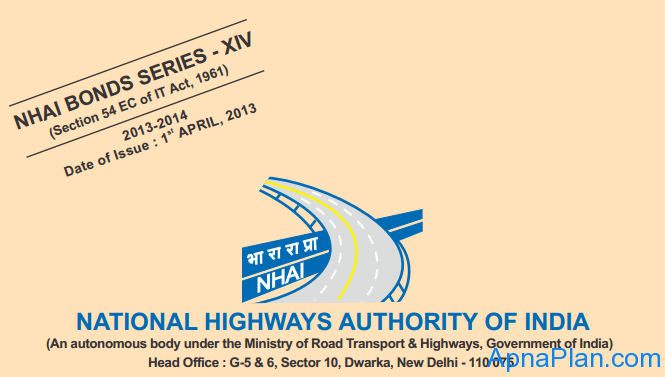In case you are looking to save your long term capital gains, National Highways Authority of India (NHAI) has come up with its fresh issue of Capital Gains Bonds (Series XIV) of Rs 4,000 crores.
NHAI Capital Gains Bonds – Significant Points:
- Offer Period: April 1, 2013 – March 31, 2014. So you can invest in these bonds for the entire financial year of 2013-14
- Annual Interest Rates: 6% per annum
- Deemed Date of Allotment: Last day of the month during which the application amount has been cleared and credited to NHAI’s collection account
- Maturity: 3 Years from date of allotment
- Price of each bond: Rs 10,000
- Minimum Investment: 1 Bond (Rs 10,000)
- Maximum Investment: 500 Bonds (Rs 50 Lakhs)
- Credit Rating: “AAA/Stable” by CRISIL and “IND AAA/Assigned” by India Ratings & Research
- Loan against Bonds: The Bonds are non-transferable, non-negotiable and cannot be Offered as a security for any loan or advance
- Trustee: Syndicate Bank, 6, Bhagwan Das Road, New Delhi-110001
- Contact person: Sh. S.K.Chauhan, Manager (F&A); Email: [email protected]; Phone: 011- 25074100-200 Extn 2479, Fax: 25093517
NHAI Capital Gains Bonds – Who can invest?
Any individual, Hindu Undivided Family (HUF), or non-resident Indians (NRIs) can invest in these NHAI capital gains bonds. The amount invested should be the long term capital gains made by selling residential property held for more than three years or more.
NHAI Capital Gains Bonds – How much Capital Gains can you Save?
The long term capital gains on sale of residential property (held for more than 3 years) are taxed at 20% with indexation. You would need to invest the long term capital gains made within 6 months of date of sale of the property.
We explain this by an example:
You bought a house in April 2007 for Rs 50 Lakhs and sold it on April 2011 for Rs 1 Crore. This is how the capital gains would be calculated.
The property has been held for more than 3 years and so it qualifies for Long term capital gains.
Next you have to look at Cost of Inflation Index (CII) published by Income Tax Department every Financial Year.
- The CII for FY 2007-08 when the house was bought is 551
- While the CII for FY 2011-12 when the house was sold is 785
- So the CII adjusted purchase cost would be Rs 50,00,000 * (785/551) = Rs 71,23,412
- Long Term Capital Gains = Rs 28,76,588 (1,00,00,000 – 71,23,412)
- Tax Liability = 20% of Rs 28,76,588 = Rs 5,75,318
So out of Rs 1 crore that you get out of sale, you would need to invest the entire long term capital gains of Rs 28,76,588 in Capital gains Bond by October 2011 (i.e. within six months of date of sale) to save tax of Rs 5,75,318.
In case you invest only part of the capital gains, the remaining amount would be taxed at 20%.

Is Capital Gains Bond Interest taxable?
There is a misconception that the interest earned on capital gains bond is tax free as there is no TDS (Tax Deduction at source) deduction by NHAI. But unfortunately the truth is the interest earned from capital gains bond is added to your income and taxed at marginal rate of your income tax.
NHAI Capital Gains Bonds – How to buy?
The application form for NHAI Capital gains bond can be obtained/ submitted at all branches of IDBI Bank and Union Bank, and select branches of few more banks like Canara Bank, Axis Bank, ICICI Bank, Yes Bank and HDFC Bank
NHAI Capital Gains Bonds – Should you invest?
If you want to save your long term capital gains tax on sale of residential property u/s 54EC, there are two options:
- Reinvest in another residential property within stipulated timeframe as per Income tax laws or
- Invest in capital tax gains bonds of RECL (Rural Electrification Corporation Ltd) or NHAI (National Highways Authority of India)
As far as the investment in capital gains bonds like NHAI is concerned, the interest offered is just 6% and that too taxable. So at times it might make sense to pay long term capital gain tax and invest the rest of amount in higher return investments.
NHAI Capital Gains Bonds – Application Form
You can get more details and detailed prospectus and application form from here.
